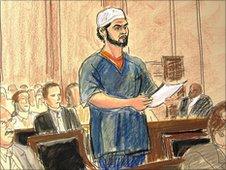Times Square bomb accused Faisal Shahzad pleads guilty
- Published

Faisal Shahzad made a statement to the court
The main suspect in an attempt to set off a car bomb in New York's Times Square has admitted weapons and terrorism charges.
Faisal Shahzad told a court in Manhattan he wanted "to plead guilty and 100 times more".
The Pakistani-born US citizen admitted all 10 charges so there will be no trial. He will be sentenced in October.
The petrol and propane bomb was left in a sports utility vehicle near Broadway theatres on 1 May but failed to ignite.
Judge Miriam Goldman Cedarbaum, in Manhattan's Federal District Court, asked Shahzad a series of questions to ensure he understood his rights.
She asked him if he understood he might spend the rest of his life in prison, to which he said he did.
Asked by Judge Cedarbaum if he was sure he wanted to plead guilty, he launched into a statement, saying he wanted "to plead guilty and 100 times more".
He said he wanted to let the US know that if it did not get out of Iraq and Afghanistan and stop drone attacks and meddling in Muslim lands, "we will be attacking US".
Shahzad, 30, who wore a white skull cap, told the packed court: "One has to understand where I'm coming from. I consider myself... a Muslim soldier."
He said he had chosen a warm Saturday night because Times Square would be crowded with people whom he could injure or kill.
He said he had packed the car with three separate bombs, hoping to set off a fertiliser-fueled bomb packed in a gun cabinet, a set of propane tanks as well as gas canisters rigged with fireworks to create a fireball.
He told the court he waited between two and a half minutes and five minutes for the bombs to erupt.
"I was waiting to hear a sound but I didn't hear a sound. So I walked to Grand Central [station] and went home," he said.
A street vendor saw smoke coming from the vehicle and alerted the police.
Shahzad was arrested two days later as he tried to take a flight to Dubai from New York's John F Kennedy airport.
He co-operated with investigators for two weeks, waiving his rights that protect arrested suspects from incriminating themselves, before requesting a lawyer, justice officials say.
Sentencing was scheduled for 5 October.
The most serious charges against Shahzad, including attempted use of a weapon of mass destruction and attempted act of terrorism transcending national boundaries, carry mandatory life sentences.
'Bomb-making training'
During their investigation, the FBI traced the purchase of the Nissan Pathfinder SUV to Shahzad, a transaction that eventually led to his arrest.
While being interrogated, Shahzad revealed he had gone to Pakistan's North Waziristan tribal region in December 2009 for bomb training with militants affiliated with the Pakistani Taliban, according to the indictment.
He is also alleged to have received about $5,000 in cash from an identified co-conspirator in Pakistan, whom he understood worked for the Taliban.
It said the same co-conspirator directed a second payment to Shahzad, of $7,000 in April, with which he bought a weapon, material to make the car bomb and the Nissan Pathfinder.